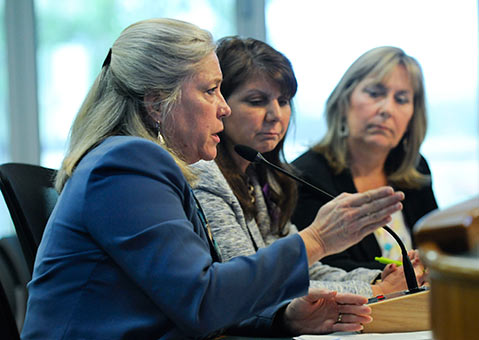Laura’s Law on Chopping Block
The Pilot Program is Only Four Months Old

Department, discusses Laura’s Law with the Board of Supervisors on May 10th, 2016.
Less than four months after the start of Laura’s Law, county supervisors find themselves confronting a proposal to deep six a pilot program fiercely championed by mental-health advocates and accepted only under political duress by the mental-health administrators running the county’s Department of Behavioral Wellness.
Behavorial Wellness executive Alice Gleghorn notified county supervisors that by eliminating Laura’s Law — designed to compel the service-resistant mentally ill to obtain outpatient treatment with the threat of court order if need be — the department could save $606,000. Like all department heads, Gleghorn is under orders to cut her department by 5 percent in response to unexpectedly high pension obligations.
While the supervisors can expect many budget skirmishes this year, the one over Laura’s Law promises to be loud, emotional, and painful. Mental-health advocate Tom Franklin — a former county fire chief — argued funding should be reinstated. All but four [counties] have versions of Laura’s Law, he said. “They work … they save money … and they keep people off the streets.” A number of women — mothers of adult mentally ill children — beseeched the supervisors to maintain funding, some struggling to hold back tears.
Laura’s Law requires mental-health caseworkers to beat the bushes in search of the mentally ill. It also requires that they persist in the face of resistance and refusal. It’s very labor intensive. “I can’t do it alone,” one mother said. “Please, don’t squash something that is good,” said another, who praised her son’s caseworker for contacting him while in psychiatric isolation at the County Jail.
Last year, the supervisors narrowly approved a Laura’s Law pilot program by a 3-2 vote. The program’s staunchest supporters — supervisors Doreen Farr and Salud Carbajal — have since stepped down. Farr’s replacement, Joan Hartmann, said nothing during deliberations, and Carbajal’s replacement, Das Williams, expressed a troubled disinclination to cut a program only four months off the ground. Mental-health advocates with Families Act! noted that similar programs run elsewhere require roughly half as much money as was set aside in Santa Barbara.


